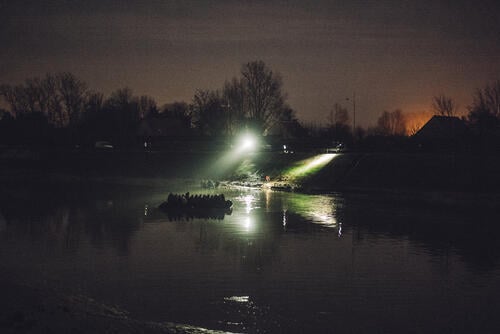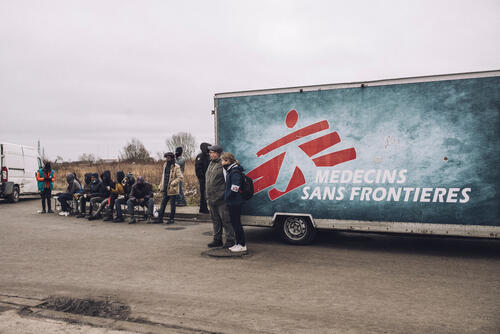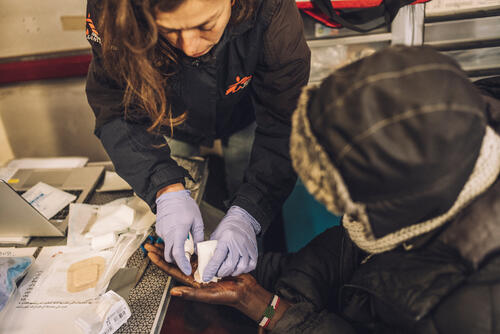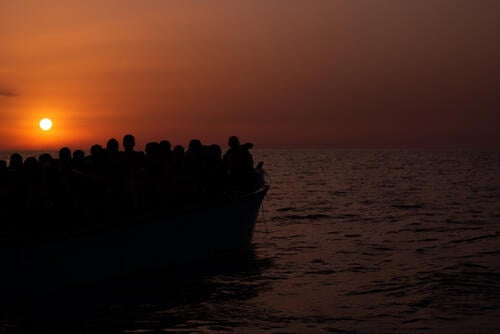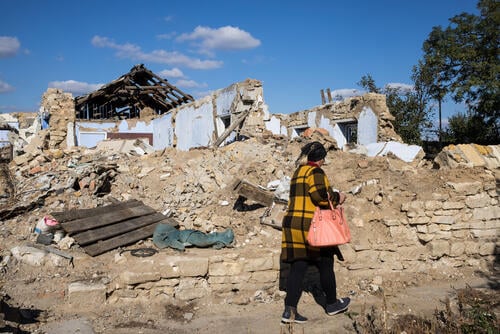Calais - With more than 1,000 people – migrants, refugees and asylum seekers – including around 100 children and teenagers, living in terrible conditions during a particularly rough winter season, Médecins Sans Frontières (MSF) has launched an emergency accommodation system for the most vulnerable people on the move in Calais, northern France.
In coordination with local associations, an emergency facility with 20 temporary accommodation places has been set up in a private structure in Calais. Opened by MSF on 22 January, it is accommodating people until 31 March 2024. Priority is being given to unaccompanied minors whose requests for shelter have been refused by the national child protection services.
Priority is also going to families with children, people whose state of health is in danger of deteriorating in the makeshift camps in the Calais area, and to survivors of shipwrecks following attempts to cross the English Channel.
The situation in Calais illustrates the failure of the security responses of France, the United Kingdom, and the European Union. Solidarity would cost less, if only in human lives.Michaël Neuman, head of MSF's activities in France
Since November 2023, the north of France has been hit hard by a series of rare storms, floods, cold snaps and snowfalls. People on the move are bearing the brunt of these extreme weather conditions.
“It is unacceptable that children, women and men are abandoned to their fate in this way,” says Ali Besnaci, coordinator of MSF’s activities in Calais. “The government is failing in its duty to protect them, so how can they be left like this, prey to the elements, violence and criminal networks?”
“The temporary accommodation available in the context of exceptional [weather] events are ill-suited to the situation of young people, because it is difficult to access and the number of places is limited,” says Besnaci. “Our activities will help to make up for these shortcomings, but the authorities must immediately offer a dignified and lasting response to the material and moral distress in which people stranded in Calais find themselves.”
Our teams continue to offer medical and psychosocial assistance to migrants, refugees and asylum seekers in transit at this port in northern France. From November to January, as part of our mobile clinics, we treated 338 patients in Calais; 184 of whom were suffering from respiratory illnesses, 81 complaining of pain linked to living conditions; and 48 were treated for injuries caused by the difficult conditions of their journey or by physical trauma.
In the middle of puddles, with their feet in the mud, wrapped in blankets and soaked clothes, with only small campfires for heating, people risk developing illnesses linked to exposure to the cold or complications due to the lack of treatment for infections.
The extreme living conditions, the cold, the insecurity, the repeated and dangerous attempts to cross the Channel by road or sea, the harassment by the police who regularly come to dislodge people from their makeshift camps, destroying their tents and confiscating their meagre personal belongings such as blankets, clothes, and telephones, all add to the fragility of people’s individual situations and their psychological state.
“Once again this winter, the dismantling of camps and forced removal of people from the coast, carried out by the police and authorities, have not prevented dangerous crossings of the Channel to England,” says Michaël Neuman, head of MSF's activities in France. “Instead, they’ve left hundreds of people even more vulnerable and without a solution.”
“The situation in Calais illustrates the failure of the security responses of France, the United Kingdom and the European Union,” says Neuman. “Solidarity would cost less, if only in human lives.”




